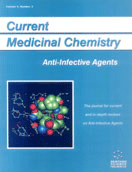Abstract
During the past two-decades the frequencies and type of life threatening fungal infection have increased dramatically among cancer patients, transplant recipients, patients with AIDS and patients receiving broad-spectrum antibiotic or parental nutrition. There has been a constant effort to develop more effective and safe antifungal drug to combat these infections. Most of the current antifungal drugs simply reduce the level of growth of fungi. Further the development of resistant fungal strains in response to the widespread use of current antifungal drugs is likely to cause serious problem in future. Therefore there is an urgent need to develop safe, efficacious and non-toxic antimycotic agents with a broad spectrum of antifungal activity. Among the variety of tools available to medicinal chemist for drug discovery programme, the combinatorial chemistry has emerged as a powerful tool for the identification of molecules with a desired selectivity profile from the libraries of several million compounds. This review will be dealing with the various structurally diverse novel prototypes with antifungal activity identified through the screening of combinatorial libraries of peptide, small organic molecule and natural product like structures.
Keywords: antifungal agents, combinatorial libraries, peptides, natural product-like structure, small organic molecules
 2
2

